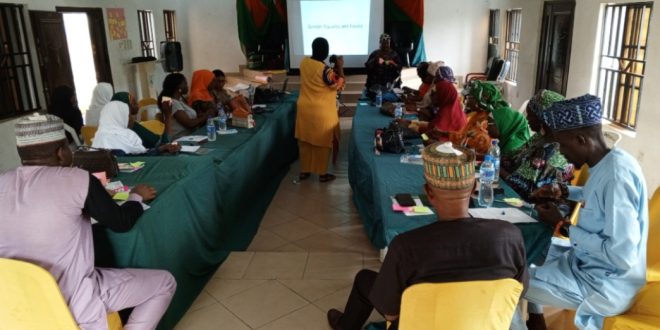By Olakunle Oyedunmola, KWARA |
Journalist have been advised to shun gender inequality among themselves and work together for better society and for the upcoming generation.
This was made known during a 3 days seminar organized by the Nigeria
Association of Women Journalists (NAWOJ), in partnership with the Norwegian Union of Journalists, which was hosted at the Nigeria Union of Journalists Secretariat in Ilorin, Kwara State.
This seminar is to focus on gender inequality and safety for women journalists, the seminar was organized by the Norwegian Union of Journalists in conjunction with the International Union of Journalists. Two journalists from across Africa were selected and trained as trainers to facilitate the program for women journalists.
During the lecture given by one of the trainers,Mrs Veronica Ogbole revealed that gender, inequality and equity have been problems for women in the society and most especially women journalists in their places of work and in the State,eg sexual harassment among others
She further explained how they can go about doing their jobs diligently and be on the safer side
Mrs. Rafat Salami, one of the trainers also, highlighted that the initiative, spanning several African countries, is supported by various international media organizations.
While speaking with NATIONAL TELESCOPE, she mentioned that training sessions have already covered 28 states in Nigeria, including the Federal Capital Territory (F.C.T.), with a few more states remaining.
She expressed gratitude for the opportunity to conduct the seminar in Kwara State during an interview.”
“Our job comes with a lot of risks,and we may not be able to deliver what we have, or we may be putting ourselves in the way of danger unknowingly if we don’t know the risks that naturally occur with our job, and that is what we’re doing”
Salami urges female journalists in the state to persist in their endeavors, emphasizing the importance of safety and delving deeper into investigative journalism.
She stresses that merely reporting daily events isn’t enough to drive change; it’s crucial to challenge authority and demand accountability from our leaders. Safety and responsibility are paramount in this pursuit.
Rafat lauds the resilience of Nigerian women, acknowledging their exceptional ability to maintain their households and manage resources amidst the country’s challenges.
“Women are the ones raising the next generation, and the work is unpaid for, unrecognized, unenumerated, and unappreciated. But a sacrifice they are making for the next generation”
She suggested that women who aren’t contributing to their households should pursue any business opportunity that allows them to balance family responsibilities without being separated from their children.
 National Telescope national telescope newspaper
National Telescope national telescope newspaper



